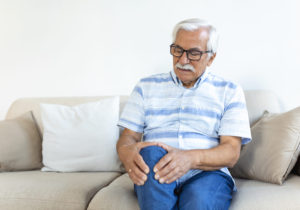Knee pain is a common complaint caused by various factors like trauma, arthritis, and overuse. It can affect people of all ages and range from a slight inconvenience to a debilitating condition. Some common symptoms of knee pain include stiffness, swelling, and difficulty moving the joint.
Dr Jyotiraditya is a knee pain doctor in zirakpur who offers ayurveda and panchkarma treatments.

Understanding knee pains
Knee pain involves various factors, including:
- Trauma: The knee is a complex joint, vulnerable to injuries, including falls, twists, and impacts. Common knee injuries include sprains, strains, and tears of the ligaments and cartilage.
- Arthritis: Arthritis is the most common cause of knee pain, especially in older adults. It is a degenerative condition of the joint that cause inflammation and damage, leading to pain and stiffness.
- Overuse: Repetitive motions, such as running, cycling, or kneeling, can lead to overuse injuries of the knee. This type of injury occurs by a combination of factors, including poor technique, improper equipment, and overtraining.
- Bursitis and tendinitis: Bursitis is inflammation of the fluid-filled sacs that cushion the joints, while tendinitis involves the tendons that attach muscles to bones. Both of these conditions cause knee pain.
- Gout: Another type of arthritis is gout. In this condition, pain occurs in the knee joint due to the deposition of crystals composed of uric acid in the joints.
- Pseudogout: Pseudogout is similar to gout and caused by the accumulation of calcium crystals in the joints.
Causes of knee pains
Knee pain can have many causes. A few of the most common include:
- Osteoarthritis: Osteoarthritis is a degenerative joint disease that occurs when the cushioning cartilage in the knee deteriorates. Loss of cushioning generates friction in the joint, causing pain, stiffness, and difficulty moving the joint.
- Rheumatoid arthritis: An autoimmune disorder that causes inflammation in the joints, including the knee causing pain, swelling, and stiffness.
- Meniscus tear: The meniscus is a cartilage in the knee that helps to cushion and stabilize the joint. A tear in this cartilage can cause pain, swelling, and difficulty moving the knee.
- Ligament tear: The knee has four ligaments that hold the contents of the joint in place. A tear in any of these ligaments can cause pain, swelling, and instability in the knee.
- Patellofemoral pain syndrome: This is also known as “runner’s knee,” this is a common overuse injury that occurs when the kneecap rubs against the thigh bone, causing pain and discomfort, particularly when bending the knee.
- Fractures: A knee fracture is a break in the continuity of the bones that make up the knee joint. Severe pain and swelling are common in this condition. The joint movement also gets restricted.
Are there gaps in the knee joint?
Gaps in the knee joint occur due to various conditions like osteoarthritis, rheumatoid arthritis, or a knee injury. These gaps can result in joint instability, pain, and difficulty walking. Treatment options vary depending on the underlying cause and may include panchakarma therapy and medication. It is essential to consult a medical professional for an accurate diagnosis and appropriate treatment plan.
Knee pain treatment with ayurveda
Ayurveda, a traditional medical system that originated in India, offers several natural treatments for knee pain. Some common Ayurvedic treatments include:
1. Massage with medicated oils: Massaging the knee with warm medicated oils help reduce pain and inflammation.
2. Ayurvedic supplements: Ayurvedic herbs such as turmeric, asthisamharaka, and guggal can be taken as supplements to help reduce pain and inflammation.
3. Yogasana: Certain yoga poses like the “Vajrasana” and “Ardha Matsyendrasana” can help to strengthen the knee joint and reduce pain.
4. Panchakarma: Panchkarma is a set of five Ayurvedic detoxification methods. These methods include inducing vomits, purgations, medicated enemas and bloodletting. Panchakarma can help to reduce pain and inflammation in the knee joint. Nidanam Wellness clinic has a complete facility of panchkarma under one roof. This clinic is managed by Dr Jyotiraditya, a knee pain doctor in zirakpur.
Dr. Jyotiraditya Agarwal

Contact Us
Testimonials

Rahul Sharma
CIVIL ENGINEER
I am very satisfied with my back pain problem that is almost 100 % resolved by treatment done at Nidanam. My problem was almost 8 years old. I had consulted so many doctors but in vain… then came to know about this clinic and now my back pain is History.


Aditi Bose
DESIGNER
I am extremely happy with my Hair Treatment done by Dr. Bhavana. I was almost on the verge of getting bald. I started my Hair treatment at Nidanam and it took me 6 months to find my scalp full of hairs back. I am Very very happy with the results.


Pulkit Rastogi
CUSTOMER
I lost almost 27 Kg here at Nidanam. They don’t make you starve nor make you exercise hard. With their specialized diet plans along with weigh loss techniques I was able to shed off those Kgs..
